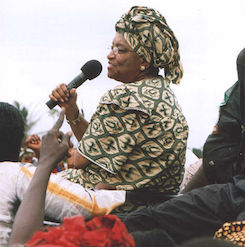By Mirjam van Reisen* | IDN-InDepthNews Analysis
BRUSSELS (IDN) – At the height of the Ebola-crisis, scenarios predicted the deaths of around 1.4 million people, or around 20.000 deaths a month. Now the World Health Organization (WHO) has declared Ebola-free. This means that no new cases have been diagnosed in the last 42 days. The total number of lives claimed by the disease in Liberia is 10,722 deaths. What lessons can be drawn from this and what should be done now?
News of a first Ebola patient in Liberia was spread in March 2014. A doctor at a large public hospital in Monrovia had attended a meeting at the University and left that same night to sound the alarm. The danger was immediately recognised by the leaders of the healthcare system in Liberia. Nonetheless, a large number of doctors and healthcare workers died in the first period, because the knowledge and means to properly face and control the disease were lacking.
An animal research laboratory in Guinea, on the border between Guinea, Liberia and Sierra Leone, was the source of the Ebola crisis. A monkey carrying Ebola escaped from its cage and a young son of an employee played with the animal. The child fell ill and died. The disease spread like wildfire. The lack of knowledge about the disease and how it is transmitted was the cause of many deaths in villages, and it allowed the disease to advance quickly in the three countries.
The outbreak had tragic consequences. Because pregnant women with Ebola had spontaneous abortions, healthcare workers were anxious to help pregnant women. Women gave birth on the streets. The three countries rapidly lost doctors, aid workers and mothers who cared for the sick, and were therefore vulnerable to infection with the Ebola virus. This caused the healthcare system to collapse. Women were especially vulnerable, because they took care of the sick.
Under the leadership of President Ellen Johnson Sirleaf, a major action plan was set up in Liberia. The disease was isolated and the population was educated through big public campaigns. In addition, the spread of the disease was stopped through early diagnosis, contact tracing, examination of infections, inspection of transport networks, and expansion of communication, information and safe burial practices. This meant that in Liberia, the disease was under control earlier than expected.
Nevertheless, the crisis has left deep marks on Liberia. Investors have left the country and the government is missing out on the important income of concessions. Agriculture and trade have been at a standstill, and cross border trade stopped. No vessels entered the largest harbour of Africa in Monrovia. The Ebola crisis caused a major setback for the development plan of Liberia.
Liberia is 90 percent dependent on the import of food and other goods. Furthermore, the country is now struggling with several major social problems. There are 4,572 officially documented Ebola orphans whom the government is seeking to place in orphanages or in host families. Ebola has affected many of the poorest and most vulnerable families. Women, sometimes elderly, are taking care of numerous children who have lost their parents to the disease.
Why did Ebola hit Liberia particularly hard? It has become clear that the disease affected especially the fragile countries. Liberia had only just started to rebuild after a lengthy civil war. In the more developed neighbouring countries such as Nigeria and Ghana, Ebola was met with a functioning healthcare system. The disease was therefore quickly brought under control.
The Ebola crisis shows that vulnerable countries are in dire need for investments in structural healthcare systems. Above all, the focus should be on care that is easily accessible and can be given by trained healthcare workers in the communities themselves.
The technology of mobile phones and Internet has recently grown strongly in Liberia, which means that more can be done by providing access to information on healthcare via new technology and communication, and by diagnostic data analysis.
The economy can be strengthened by the means of training, education, agriculture and improving the opportunities for small businesses. That is why President Sirleaf has called for a large-scale aid operation, especially now that the Ebola crisis is under control.
Before the Ebola crisis, the European Union had allocated 50 million euros a year to help build up a healthcare system in Liberia. Due to the slow implementation of this aid, the result was inadequate; the Ebola crisis has cost the international community about USD 1 billion. Managing a crisis of this scale is expensive and a very ineffective way to use resources, especially when it could be controlled by preventive measures.
The Ebola crisis could have been prevented. This is why it is of paramount importance to offer structural aid to vulnerable countries. The Ebola crisis is a perfect illustration of how structural aid is much more cost-effective than crisis aid, on top of the lives it saves. This is exactly why structural aid needs to be expanded. As such, President Sirleaf is speaking from experience when she calls for a Marshall Plan aid package by the international community so as to restore and rebuild her country. It is needed now more than ever.
*Prof. Dr Mirjam van Reisen is Professor International Social Responsibility, Tilburg University, Director Europe External Policy Advisors (EEPA), and Member of the Dutch Government Council on International Affairs and Chair of the Development Cooperation Commission. She is author of the “Human Trafficking Cycle, Sinai and Beyond”, 2014, Wolf Publications. [IDN-InDepthNews – 9 May 2015]
Photo: President Sirleaf campaigning in Monrovia in 2005, shortly before she was elected. Credit: Uwe Kerkow | Wikimedia Commons
The writer’s previous IDN articles:
http://www.indepthnews.info/index.php/search?searchword=Mirjam%20van%20Reisen&ordering=newest&searchphrase=all
2015 IDN-InDepthNews | Analysis That Matters
Send your comment | Subscribe to IDN newsletter
Follow us on Twitter and Facebook:
http://twitter.com/InDepthNews
http://www.facebook.com/IDN.GoingDeeper

